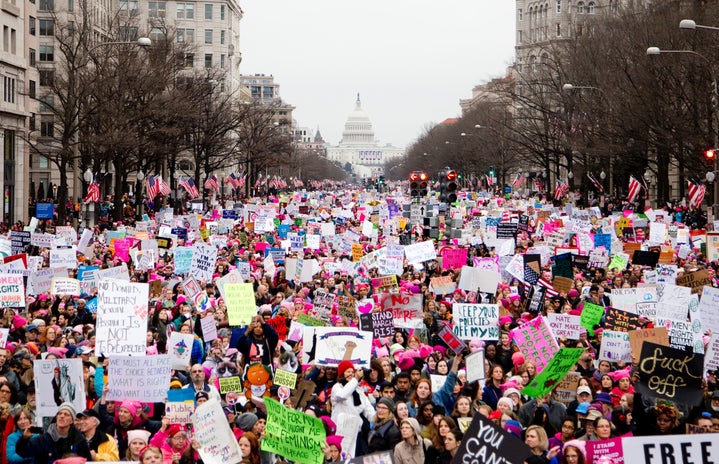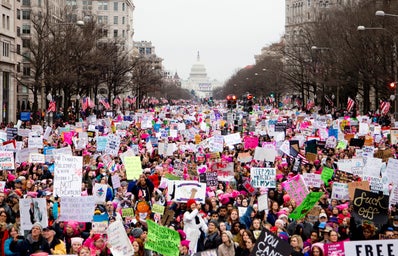Every day, we see new, or rather, resurfacing, issues that are happening around the world, ranging from wars to oppressing laws to murders. If you’ve been paying any attention, you’ve seen that the majority of people taking the brunt of these atrocities are women.
Despite what we may all think, our society hasn’t progressed as much as it seems. In fact, it often feels as if we’re moving backwards. Here are some instances and issues that show what it’s like to be a woman in 2023 in various parts of the world.
The United States: Abortion
As most of us may already know, many states in the U.S. have banned abortions in almost all circumstances, stripping women of their bodily autonomy.
In some states, even if it’s to save the mother’s life, women cannot get an abortion, as fetuses’ lives are valued more.
What does that tell us?
The abortion ban has caused numerous problems for pregnant women in the U.S., including forcing women to cross state lines just to get an abortion. This costs them both time and money to get what can sometimes be a necessary medical procedure.
The ban presents further challenges to women’s health because it creates significant mental health issues for those who don’t want to carry out their pregnancy to full term. According to Human Rights Watch, preventing women from getting abortions increases their risk of suicide, overshadowing the state’s claim to care about its citizens.
In any case, criminalizing abortion won’t stop people from getting abortions — the only thing it’s preventing is safe abortions. Medical schools in states where abortions are banned are given very limited teachings regarding abortion. All in all, this ban will only instill a decreased trust in the health care system and state, increasing medical risks.
Even for those who aren’t pregnant, this ban presents a vital issue because if the country can take away women’s bodily autonomy, they’re more than capable, and probably even willing, to do more.
At this rate, pregnant people have two choices: carry out an unwanted and/or dangerous pregnancy or risk prosecution, both of which will significantly impact their lives in unwanted and negative ways.
A person shouldn’t have to justify their need for an abortion — it’s a right, not a privilege. Why do governments insist on exerting control over women’s bodies? What do they get out of it?
They claim to do this for the fetuses — and yet when these children are born, they can end up in foster care, homeless, or in families where they are unwanted and abused.
Does the state care, then? Not even a little bit.
Iran: “Morality” Police
16-year-old Armita Geravand and 22-year-old Mahsa Amini were two young women killed by Iran’s so-called “morality” police for not abiding by the country’s strict dress codes.
In Iran, the law dictates women to completely cover their hair with a hijab (headscarf) and wear long, loose clothing to cover their figure. Those who don’t can face legal prosecution and, like Geravand and Amini, potentially even death.
Amini was killed on Sept.16, 2022, for not abiding by the country’s dress code. She was taken to a detention centre and later collapsed, falling into a coma and dying three days later. While authorities claim her death was related to an underlying health condition, something her family denied, witnesses reported that officers had beaten her multiple times while bringing her to the detention centre.
A little over a year later, we saw a similar tragedy play out with Geravand, who was assaulted by the police for not wearing a hijab and was later pronounced brain dead. Again, officers denied they had any part to play in this, claiming Geravand collapsed due to low blood pressure.
Many journalists who have covered these murders have been arrested, but Iranian women refuse to be silenced. They are fighting back, burning headscarves and refusing to wear them altogether, starting a movement that, while risking their lives, they strive to continue until they get the freedom they deserve — a freedom they shouldn’t have to fight for, or die for, in the first place.
As someone who wears a hijab, I fully support a woman’s right to wear a hijab — along with her right to not wear one. What makes it the government’s business to not only dictate how women dress but to kill them for not obeying? We are again seeing women’s bodily autonomy be compromised and the immense dangers they are forced to face for refusing to comply.
Canada: Missing and Murdered Indigenous Women
Despite Canada’s polite and welcoming facade, it’s just that: a facade. This becomes clear when studying the country’s mistreatment and eradication of Indigenous peoples, specifically Indigenous women.
In the last few decades, it is estimated that thousands of Indigenous women and girls have gone missing and/or been murdered. However, most of these cases were dismissed because authorities claimed they didn’t involve foul play, despite families and evidence saying otherwise.
The “Highway of Tears” is an area where around 50 Indigenous women and girls have gone missing since 1969. For years, warning signs were placed around the roads that read “Girls Don’t Hitchhike on the Highway of Tears, Killer on the Loose.” Only this year were the signs replaced by Carrier Sekani Family Services to change the narrative and emphasize solidarity between Indigenous communities and the victims’ families.
This lack of attention to missing and murdered Indigenous women creates an active distrust in the so-called “justice” system and purposely seeks to eradicate Indigenous people, solidifying the country’s rule over the land it stole in the first place. As is the case with many minorities, the police don’t keep Indigenous peoples safe but are actively doing the opposite.
Genocide is a scary word. But what’s happening in Canada, no matter how slow or imperceptible it seems, can only be labelled as such. This kind of violence is clearly targeted, and the government continues to do nothing to stop it.
Palestine: Genocide and Pregnant Women
There is a genocide happening in Gaza. The Israeli government is killing Palestinians and striking Gaza. Women and children are taking the brunt of the impact, making up around 70% of the nearly 10,000 people killed at the start of this crisis.
Palestinians are facing attacks every day and individuals and families are being displaced. According to the United Nations Population Fund (UNFPA), there’s no electricity, a severe shortage of water, and hospitals are being bombed. Amidst all this, around 180 women are giving birth every day. Due to the dwindling supplies and hospitals, many of them might end up giving birth in the rubble — and that’s assuming they’re even able to do so.
In the span of just a little over a month, the World Health Organization (WHO) said there have been 335 attacks on healthcare facilities, meaning fewer hospitals and staff are able to help those in need.
Doctors have no soap or water to sanitize their hands and are even running out of anesthetic. Not only does this dangerously heighten the risk of infection, but one cannot even imagine the pain of having a C-section without anesthesia.
Because of the bombings and stress, there have been many premature births, including those happening while the mother lay dying. It’s because of the stresses of this horrifying situation that, along with premature births, multiple women have experienced stress-induced miscarriages and stillbirths.
Currently, there are around 50,000 pregnant women in Gaza, with less than 35 hospitals, a number which keeps decreasing. Babies are being born into war. Many of them are born orphans and will never even get to see their mother’s face.
Even if the baby is safely delivered, what then? Who’s going to take care of them? Where can they possibly go? Frankly, it’s extremely difficult to care for a child when they don’t have a family, a home, food, or sanitary products to prevent diseases and health issues.
And what has most of the world been doing in response to this? Nothing — aside from arming the oppressors, of course.
Afghanistan: Erasure of Women
Women’s rights are being erased in Afghanistan. As such, women themselves are becoming invisible.
Despite having fought for their rights for years, women in Afghanistan are once again facing immense oppression. They are being shunned from society and have been banned from public settings like parks and gyms.
Women are also forbidden from working outside of the health and education fields. Through this, the law is enforcing certain gendered roles, restricting women’s possibilities and rife futures. This quashing of possibilities is also enforced by banning women from pursuing education beyond the sixth grade.
What exactly makes women less worthy of an education? What’s left for them if they can’t go to school, work, or anywhere they please? Why does equality have to be a fight?
This issue may seem far away, but is it really? Aren’t women’s bodily autonomy and basic human rights being threatened right next door in the U.S., where some women can’t have a baby on their own terms? Where does it end? When will it end?
These aren’t just women’s issues; they’re humanitarian issues. If something affects one of us, it affects all of us.
Women are not second-class citizens. Women are not something for you to control. Women do not exist for the pleasures or expectations of men. The fact women have to fight every day just to make these facts known says it all.
The next time someone wonders what it’d be like to live in a dystopian world, just tell them to be a woman — then they’ll really know what a dystopia is.
Correction (11/29/23): A previous version of this article said over 300 Indigenous women and girls went missing or were murdered between 1960-2018; this statistic is outdated. It has been updated to reflect current statistics.


